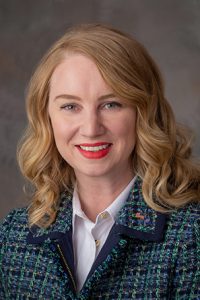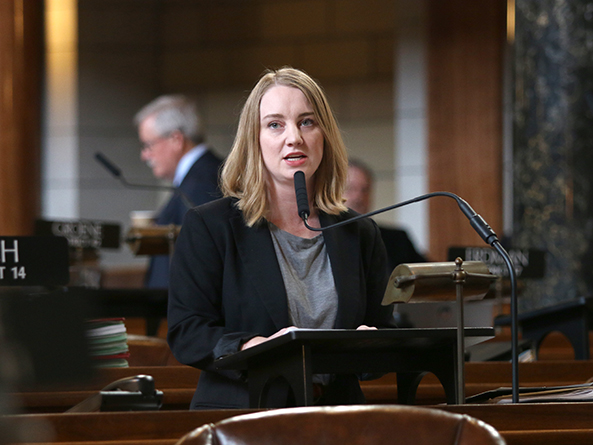Compensation for amateur athletes advanced
Nebraska college and university athletes could earn income under a bill advanced from general file Feb. 25.

LB962, sponsored by Omaha Sen. Megan Hunt, would allow college athletes at public and private schools to earn money from their name, image and likeness rights. Only 2 percent of college and university athletes will go on to play professionally, Hunt said.
“I was surprised to learn that 100 percent of student athletes in Nebraska … are legally prevented from participating in the free market and earning any wages at all for their athletic skills and talents,” she said.
The bill would prohibit any postsecondary institution or athletic association from penalizing or punishing a student athlete who enters into a commercial contract, as long as it does not directly conflict with a team contract.
Student athletes would be required to report any personal contracts to their postsecondary institution and would be barred from wearing a sponsor’s apparel or otherwise advertising for the sponsor during official team activities.
LB962 also would allow student athletes to obtain professional representation to negotiate related contractual or legal matters. An athlete could seek civil damages against their postsecondary institution or athletic association if they believe their right to seek compensation has been violated.
Sen. Adam Morfeld of Lincoln supported the measure. The bill is a moderate approach to ensuring fairness for student athletes, he said. Coaches and administrators currently make millions off of athlete’s hard work, Morfeld said, and student athletes at least should have the ability to earn money from their name, likeness and image.
Omaha Sen. Ernie Chambers also supported the bill, saying it would be a valuable recruiting tool.
“If other schools allow their athletes to do this and UNL does not, then the players will not come here,” he said. “They will go to a school where they can receive some compensation for misuse or use of their name.”
An amendment offered by Lincoln Sen. Matt Hansen, adopted 26-2, clarified that any compensation earned by a student athlete would be factored into any application for need-based financial aid.
Schools also would have until July 1, 2023, to implement a framework for handling student athlete compensation.
Gretna Sen. Andrew La Grone also offered an amendment that would implement a one-year statute of limitation from the cause of action for any student filing a civil complaint against his or her school.
Opposing the bill was North Platte Sen. Mike Groene. He said LB962 would transform college athletic recruiting into an inequitable bidding war.
“[Recruiting] will have nothing to do with our facilities or our fan base, it’ll be about the money because we understand that one quarterback can make the difference in a national championship,” Groene said.
Sen. John Lowe of Kearney also opposed LB962. He said it could negatively impact Nebraska schools’ current relationships with their respective athletic conferences.
“If we’re unsure of how conference commissioners will react to this bill, I’m afraid we’ll put our schools at risk of being punished by their conferences,” Lowe said. “Could they decide Nebraska is in violation of our agreement and limit or completely suspend [television] revenue sharing with UNL?”
Following the 31-0 adoption of the La Grone amendment, senators voted 36-4 to advance the bill to select file.


